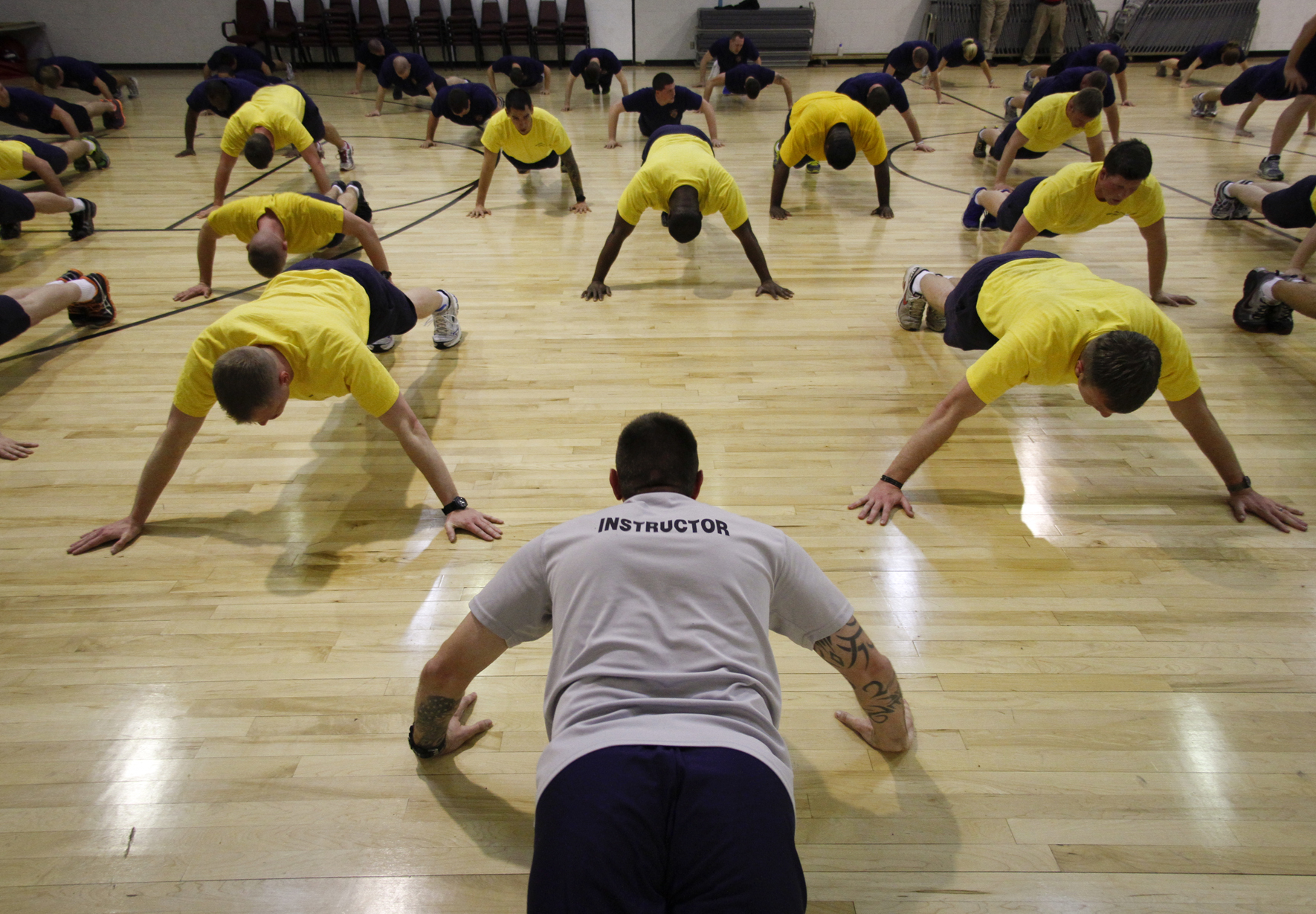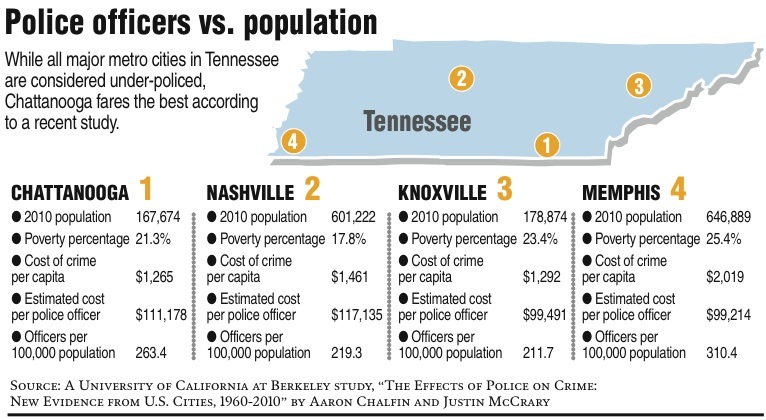Tennessee cities have too few police, study says
Friday, January 1, 1904
CLASS MAKEUP• One female cadet• Four black cadets• One Asian cadet• One Hispanic cadet• Out of the 24 cadets enrolled in Chattanooga police academy, the youngest is 21 and the oldest is 39 years old.PHYSICAL REQUIREMENTS• 1 1/2 mile run completed within 14 min 36 seconds• 25 push ups in a minute• 29 sits ups in a minute• Cadets must be able to bench press 82 percent of their bodyweight• Complete a vertical jump of 18 and a half inches• Run 300 meter run in 60 seconds
Four rows of mostly young men with buzzed haircuts stand at ease with their hands clasped behind their backs inside a training room on Amnicola Highway. Only one woman stands among them, her hair neatly swept back in a bun.
After 20 weeks of training, the cadets who meet the standards will become the newest members of the Chattanooga Police Department by early summer.
Police Chief Bobby Dodd said he hopes to increase the number of officers on Chattanooga streets. The department is authorized to have 470 officers, but has 12 openings due to retirements, people quitting and terminations which has left the number of officers at 458.
The department has an agreement with the mayor and council members to increase the number of officers to 500 by 2015.
"Our biggest concern is violence. Gun violence. Gang violence. Things like that. I've got 10 officers and a supervisor on my crime suppression unit. Basically, our gang investigation and response unit," he said.
In addition, he said the city's annexation of more land will require more officers.
"We're fine with the coverage we have, but eventually if you continue to annex and the calls for service go up, we'll have to have more officers."
A University of California at Berkeley study released in November supports the need for more officers within the city.
The study, which examined 242 police departments nationwide, analyzed city populations, crime data, projected costs of crime and department staffing levels.
About 75 percent -- 183 -- are underpoliced, including Chattanooga and all of the other major metro cities in Tennessee.
When compared to other metro police departments within the state, Chattanooga is the best-staffed department.
However, the cost of Chattanooga's crimes still outweighs the cost of adding more police officers, the study found.
"In many ways police are just like insurance, in the sense, even if you aren't a victim of a crime, having police around reduces the risk of it," said Justin McCrary, a Berkeley professor of law.
The study shows other Tennessee cities are more underpoliced than Chattanooga. Memphis and Knoxville are among the top 30 underpoliced cities.
The most under-policed city is Gary, Ind., followed by New Orleans and Flint, Mich. The most over-policed cities are Sunnyvale, Calif., followed by Waltham, Mass., and Torrance, Calif.
Police reduce violent crime more so than property crime, the study found.
"It's not a benefit that will be realized in a pocketbook," McCrary said. "The benefit is there is less chance you'll be victim of a crime."
Policing not for everyone
In the classroom, cadets listen to lectures on state laws, city ordinances, search and seizure laws and firearms training. Part of their time is spent practicing defensive moves and undergoing physical training.
A sign on a classroom wall shows a picture of the late Sgt. Tim Chapin, who was shot and killed in the line of duty two years ago. The words, "Dedication. Service. Sacrifice," are listed below with an American flag background. A motto reading, "Lead, follow or get out of the way," marks a blue sign above Chapin's picture. Pictures of past academy graduating classes line the walls.
Not all of the cadets are expected to don uniforms or even complete training on the street when paired with a field training officer.
"We try to have at least one academy with 30 to 35 cadets in it. Then we'll probably lose between five to 10 of those in the process of the academy or in field training," Dodd said. "We're hoping we'll gain 10 people per year."
One officer dropped out after hearing a recording of the radio traffic leading up to the deaths of two Chattanooga officers. Audio was played of officers responding to the robbery when Chapin was shot and killed in 2011 and the call when Officer Julie Jacks was killed in 2002. Cadets also watched a video of an officer from another department who was shot in the face with a shotgun. He survived.
"[The cadet] wasn't sure it was the job for him," Dodd said. "He said he didn't want his indecisiveness to lead to him or someone else getting hurt or killed."
Cadets who fail more than three written exams are kicked out. Some don't meet the physical training requirements. Some aren't proficient in handling a gun.
It takes work to increase the number of officers on the streets, who serve as the backbone of the department.
"I don't think you're ever going to see a community or department say, 'We have too many officers,'" said Joe Carpenter, who is a full-time instructor at the police academy. "Or anyone say, 'I think we're too safe.' You can always use more."
The backgrounds of the cadets vary.
"You have some military guys. You have some college kids and you've got everything in between," Carpenter said.
Reginald Pilinko, 31, a cadet who has 10 years of experience in the military and working for a federal agency, said the academy strikes a balance between creating physical intensity and mental stress to help students learn what the job requires.
Despite the risks that instructors describe, Pilinko said he believes the job is for him.
"Personally, it's just part of who God's made me to be. There are certain people I think all they ever wanted to do was be a lawyer and that's in their hearts," he said. "And for me, I always wanted to run down bad guys and take care of good people. That's the way I am."


